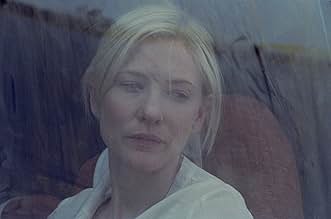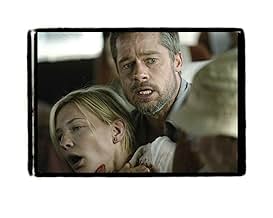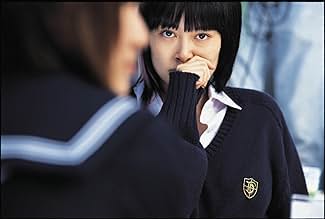La tragedia sorprende a un pareja cuando está de vacaciones en el desierto marroquí, dando comienzo a una historia entrelazada que afecta a cuatro familias diferentes.La tragedia sorprende a un pareja cuando está de vacaciones en el desierto marroquí, dando comienzo a una historia entrelazada que afecta a cuatro familias diferentes.La tragedia sorprende a un pareja cuando está de vacaciones en el desierto marroquí, dando comienzo a una historia entrelazada que afecta a cuatro familias diferentes.
- Dirección
- Guionistas
- Elenco
- Ganó 1 premio Óscar
- 45 premios ganados y 137 nominaciones en total
Opiniones destacadas
Alejandro Gonzalez Inarritu's Babel weaves four disparate and seemingly unrelated tales into a distinct, gritty narrative about the importance of communication - and what can happen when it goes awry. The movie is oftentimes difficult to watch, with ultrarealistic cinematography and gutsy, honest performances from its entire cast, particularly Oscar-nominated actresses Adriana Barraza (Amelia) and Rinko Kikuchi (Chieko).
Told nonlinearly, the movie describes the travails of a troubled married couple with a tour group in Morocco, played by Brad Pitt and Cate Blanchett. Something in their past has driven them apart, and to help deal with the problem they have taken a trip together. Meanwhile, the sons of a shepherd fight over who's the better shot with their new rifle and fire a blast at the couple's tour bus, critically wounding Susan (Blanchett).
Richard (Pitt) calls home in San Diego to notify the nanny of their children, Amelia; Amelia is in a bit of a bind, because she expected the parents home so she could attend the wedding of her son in Mexico. With Richard and Susan not returning soon, and with no one else available to watch the children, she takes them with her to the wedding.
In Japan, a deaf-mute Japanese girl acts out in reaction to her mother's suicide, which she discovered; the virginal Chieko becomes a huge sexual flirt, even removing her panties in a crowded restaurant to flash older boys. Chieko craves human contact but feels that the world's even more shut off to her now than ever before, and she sullenly shuns even her father's attentions.
It should go without saying that this film really isn't for everyone. It's gut-wrenchingly tough to watch at times, especially when Susan's wound is being treated. You can readily imagine how it'd be if you, an unworldly American, were suddenly in dire need of expert medical attention in a part of the world that wasn't really famed for it. That's enough to strike terror in me already, and I haven't even mentioned how Richard and Susan are awaiting help to arrive in a small, impoverished village with no running water or electricity - and only one person who can speak English to them.
How exactly these stories are commingled becomes evident as the movie progresses, but it's not all elegantly laid out for the viewer to immediately grasp; this is accomplished in part by the nonlinear storytelling. We see a scene near the end of the movie that is a mirror image of one from the beginning, except told from a different character's perspective. That's a tribute to the wonderful camera-work and editing by, respectively, Rodrigo Prieto and the team of Douglas Crise and Stephen Mirrone.
Barraza turns in a powerful, heart-breaking performance; at one point, she's stranded in the middle of the Sonoran desert with her two young charges clad in her dress from the wedding. Dazed by the blistering heat, Amelia cannot gain her bearings in the blazing heat, and she despairs. Then she makes a critical decision with devastating consequences.
Kikuchi is absolutely mesmerizing as the silent Chieko. Without uttering one word, she's able to convey a vast array of emotions, from loneliness to hostility to love to lust to affection. She's alternately serene and violent, in charge of and captured by her impediment. Chieko resents her father, her volleyball teammates, and most of all every so-called normal person who looks at deaf-mutes as monsters, creatures to be scorned and taken advantage of. Like Barraza, Kikuchi's role called for a difficult sacrifice: plenty of nudity.
Babel is a spellbinding, multifaceted story with towering, passionate performances by all of the leads. It's full of moxie and stark realism, and despite some minor plot implausibilities, it's a true feather in the cap for Inarritu.
Told nonlinearly, the movie describes the travails of a troubled married couple with a tour group in Morocco, played by Brad Pitt and Cate Blanchett. Something in their past has driven them apart, and to help deal with the problem they have taken a trip together. Meanwhile, the sons of a shepherd fight over who's the better shot with their new rifle and fire a blast at the couple's tour bus, critically wounding Susan (Blanchett).
Richard (Pitt) calls home in San Diego to notify the nanny of their children, Amelia; Amelia is in a bit of a bind, because she expected the parents home so she could attend the wedding of her son in Mexico. With Richard and Susan not returning soon, and with no one else available to watch the children, she takes them with her to the wedding.
In Japan, a deaf-mute Japanese girl acts out in reaction to her mother's suicide, which she discovered; the virginal Chieko becomes a huge sexual flirt, even removing her panties in a crowded restaurant to flash older boys. Chieko craves human contact but feels that the world's even more shut off to her now than ever before, and she sullenly shuns even her father's attentions.
It should go without saying that this film really isn't for everyone. It's gut-wrenchingly tough to watch at times, especially when Susan's wound is being treated. You can readily imagine how it'd be if you, an unworldly American, were suddenly in dire need of expert medical attention in a part of the world that wasn't really famed for it. That's enough to strike terror in me already, and I haven't even mentioned how Richard and Susan are awaiting help to arrive in a small, impoverished village with no running water or electricity - and only one person who can speak English to them.
How exactly these stories are commingled becomes evident as the movie progresses, but it's not all elegantly laid out for the viewer to immediately grasp; this is accomplished in part by the nonlinear storytelling. We see a scene near the end of the movie that is a mirror image of one from the beginning, except told from a different character's perspective. That's a tribute to the wonderful camera-work and editing by, respectively, Rodrigo Prieto and the team of Douglas Crise and Stephen Mirrone.
Barraza turns in a powerful, heart-breaking performance; at one point, she's stranded in the middle of the Sonoran desert with her two young charges clad in her dress from the wedding. Dazed by the blistering heat, Amelia cannot gain her bearings in the blazing heat, and she despairs. Then she makes a critical decision with devastating consequences.
Kikuchi is absolutely mesmerizing as the silent Chieko. Without uttering one word, she's able to convey a vast array of emotions, from loneliness to hostility to love to lust to affection. She's alternately serene and violent, in charge of and captured by her impediment. Chieko resents her father, her volleyball teammates, and most of all every so-called normal person who looks at deaf-mutes as monsters, creatures to be scorned and taken advantage of. Like Barraza, Kikuchi's role called for a difficult sacrifice: plenty of nudity.
Babel is a spellbinding, multifaceted story with towering, passionate performances by all of the leads. It's full of moxie and stark realism, and despite some minor plot implausibilities, it's a true feather in the cap for Inarritu.
"Babel" centers on several groups of people in 4 countries that are all connected by one freak accident
Alejandro González Iñárritu takes us from North Africa to North America to Asia
His film exposes four unconnected story lines that are eventually divulged to be inextricably linked to one another
The first involves an isolated family of goat herders who live in the High Plateaus of the Moroccan desert where two young boys are testing a rifle's range handed by their father to protect their goats from jackals...
The second concerns a Middle-class American couple on a bus tour of Morocco trying to save together their damaged marriage
Meanwhile, in the US, there is grave danger for an undocumented immigranta Mexican nanny as she tries to return to United States after she wrongfully decides to take her two blonde-haired young charges to her son's wedding across the Mexican border, despite her employers' sudden change of plans, that needs that she remains with them and miss the joyful occasion
And on the opposite side of the world, we follow, in Tokyo, an alienated, confused deaf and mute teenage student, recovering from her mother's suicide, who eases her feelings of depression and loneliness by trying to win the friendship or attention of every man or adolescent who crosses her path She flirts with sexual exhibitionism to attract the attention of her distant and uncommunicative father
"Babel" tries to make a point and the point is that when people can't or won't communicate, unpredictable paths can lead to tragic consequences It also tries to leave a message of how a 'shooting' from a simple 'gift' can set off a chain reaction of tragic events in three continents and four countries over which the different characters have exceedingly uncomfortable human emotion
Out of the entire cast, it is only Rinko Kikuchi as Chieko who steals the movie especially when she transmits to her friends her mad decision of sexual aggressiveness, saying to all: "Now they're going to meet the real hairy monster." This scene remembered me, in some way, Sharon Stone uncrossing legs in "Basic Instinct."
The first involves an isolated family of goat herders who live in the High Plateaus of the Moroccan desert where two young boys are testing a rifle's range handed by their father to protect their goats from jackals...
The second concerns a Middle-class American couple on a bus tour of Morocco trying to save together their damaged marriage
Meanwhile, in the US, there is grave danger for an undocumented immigranta Mexican nanny as she tries to return to United States after she wrongfully decides to take her two blonde-haired young charges to her son's wedding across the Mexican border, despite her employers' sudden change of plans, that needs that she remains with them and miss the joyful occasion
And on the opposite side of the world, we follow, in Tokyo, an alienated, confused deaf and mute teenage student, recovering from her mother's suicide, who eases her feelings of depression and loneliness by trying to win the friendship or attention of every man or adolescent who crosses her path She flirts with sexual exhibitionism to attract the attention of her distant and uncommunicative father
"Babel" tries to make a point and the point is that when people can't or won't communicate, unpredictable paths can lead to tragic consequences It also tries to leave a message of how a 'shooting' from a simple 'gift' can set off a chain reaction of tragic events in three continents and four countries over which the different characters have exceedingly uncomfortable human emotion
Out of the entire cast, it is only Rinko Kikuchi as Chieko who steals the movie especially when she transmits to her friends her mad decision of sexual aggressiveness, saying to all: "Now they're going to meet the real hairy monster." This scene remembered me, in some way, Sharon Stone uncrossing legs in "Basic Instinct."
I loved "Amores Perros" It was revolutionary in so many ways and smelled like the real thing even if I couldn't quite put my finger as to what the real thing really was. "21 Grams" had gigantic intentions and superb performances but didn't feel quite revolutionary because we had kind of seen it before - and better - in "Amores Perros". Now "Babel" and, my goodness, the first thing that comes to mind is, what an extraordinary filmmaker Inarritu really is. I suspect that his universe, even if it feels infinite, it is framed - beautifully so - between the walls of biblical references. His methods may be way ahead of the times but the roots are as ancestral as fire itself. I'm not sure where I want to go with all this but the question is, Inarritu is taking me places and that's what I long for in a filmmaker. He's not taking any of us for granted and I'm very grateful for that. His movies are experiences and I for one can't wait for the next one.
There's something unique to film, something relatively new in the word that has had profound effect on how we relate to art.
I call it noir, and define it a bit differently than the ordinary fellow, who thinks it has something to do with dark shadows and unhappy endings.
For me, noir is centered on the idea that the camera represents our eyes; that the nature of the world we see is bent by us watching it; and that the fate of the characters in that world are arranged sometimes by extreme coincidence for our purposes. The extreme photography is an indicator of that eye, and not necessarily a characteristic of noir. The camera might not be cinematically introduced, though of course it usually is.
I'm interested in the evolution of noir because its right at the edge of how we construct narrative, how we experiment with ideas and the stories we swim in. But what does a filmmaker do if that edge is always moving? Nearly every film I see that was made recently has some twist on the exploration this is how genres mature today, and how we build tools to see ourselves.
For some reason, its the Spanish-speaking filmmakers that are doing the most interesting work in pushing this further, and effectively.
What Iñárritu does is especially adventurous. I particularly appreciate it because instead of rattling around in established cinematic conventions, he's trying to extend to new ones. Well, not precisely new, but newly recast. I like his idea of narrative braiding, but that's only part of his adventure on the edge. Its what he leaves out that matters. The absences aren't noticed because of the way things are sliced and respliced. And people think the story is important, which of course it isn't, just a pointer: here generally misinterpreted as miscommunication. Deliberately so, I think.
Those elided parts mean that we fill in more of the story than usual, that the container of a long form film can be bigger than usual. That it presents an open world. What's new for Iñárritu is the notion of referring to large sweeps of society as metaphors; and also new is the idea of lacing watchers in the story, here a disembodied global TeeVee audience. They "watch" but of course see almost nothing of what we see.
Its about listening transformed into watching; each of the three threads involves watching. The Japanese episode of course literally has watching as listening and the lasting trauma of what has been seen. The Morrocan episode is triggered by a boy spying on his nude, colluding sister, and on the Brad Pitt side about a reluctant busload of watchers. The Mexican story has a woman going to see her son's wedding and having trouble with being seen clumsily.
Sight. Made explicit of course by the cinematic flourishes, the deliberate differences in the three camera stances, whose differences penetrate to primitives beyond grain, light, stance to the soul of the eye. Its as if Iñárritu decided to create three of the most elementary braids of sight he possibly could with the notion that their cleanliness would allow them to braid into a larger container than any other film.
Its one of the most exciting things happening. Almost thankfully he underused Cate, who is one of the few actresses who could hint that everything other than her we see is in her mind. Almost thankfully he underplays the merger into one soul of three wonderful actresses.
Almost, but not quite thankfully, he only hints at the notion of detective work, three types of discovery.
Its delicate, good, rich, dangerous without seeming so.
Ted's Evaluation -- 3 of 3: Worth watching.
I call it noir, and define it a bit differently than the ordinary fellow, who thinks it has something to do with dark shadows and unhappy endings.
For me, noir is centered on the idea that the camera represents our eyes; that the nature of the world we see is bent by us watching it; and that the fate of the characters in that world are arranged sometimes by extreme coincidence for our purposes. The extreme photography is an indicator of that eye, and not necessarily a characteristic of noir. The camera might not be cinematically introduced, though of course it usually is.
I'm interested in the evolution of noir because its right at the edge of how we construct narrative, how we experiment with ideas and the stories we swim in. But what does a filmmaker do if that edge is always moving? Nearly every film I see that was made recently has some twist on the exploration this is how genres mature today, and how we build tools to see ourselves.
For some reason, its the Spanish-speaking filmmakers that are doing the most interesting work in pushing this further, and effectively.
What Iñárritu does is especially adventurous. I particularly appreciate it because instead of rattling around in established cinematic conventions, he's trying to extend to new ones. Well, not precisely new, but newly recast. I like his idea of narrative braiding, but that's only part of his adventure on the edge. Its what he leaves out that matters. The absences aren't noticed because of the way things are sliced and respliced. And people think the story is important, which of course it isn't, just a pointer: here generally misinterpreted as miscommunication. Deliberately so, I think.
Those elided parts mean that we fill in more of the story than usual, that the container of a long form film can be bigger than usual. That it presents an open world. What's new for Iñárritu is the notion of referring to large sweeps of society as metaphors; and also new is the idea of lacing watchers in the story, here a disembodied global TeeVee audience. They "watch" but of course see almost nothing of what we see.
Its about listening transformed into watching; each of the three threads involves watching. The Japanese episode of course literally has watching as listening and the lasting trauma of what has been seen. The Morrocan episode is triggered by a boy spying on his nude, colluding sister, and on the Brad Pitt side about a reluctant busload of watchers. The Mexican story has a woman going to see her son's wedding and having trouble with being seen clumsily.
Sight. Made explicit of course by the cinematic flourishes, the deliberate differences in the three camera stances, whose differences penetrate to primitives beyond grain, light, stance to the soul of the eye. Its as if Iñárritu decided to create three of the most elementary braids of sight he possibly could with the notion that their cleanliness would allow them to braid into a larger container than any other film.
Its one of the most exciting things happening. Almost thankfully he underused Cate, who is one of the few actresses who could hint that everything other than her we see is in her mind. Almost thankfully he underplays the merger into one soul of three wonderful actresses.
Almost, but not quite thankfully, he only hints at the notion of detective work, three types of discovery.
Its delicate, good, rich, dangerous without seeming so.
Ted's Evaluation -- 3 of 3: Worth watching.
a film. many stories. great actors. Babel has the gift to be more than a film. or giving a story. or proposing characters. it is a sort of manifesto. about the roots of every day reality. about the price of success, happiness, love, sacrifices, victories, sadness. and that did it a sort of poem. about its public more than about the evolution of characters. a film about mark of gestures. about decisions and believes and science to accept the truth. it is not easy to define it. because entire film is in the space of the frame of the last scenes. a film about ordinaries people. in a labyrinth. as parts of labyrinth. looking the second chance. or, more exactly, the essence of freedom against yourselves.
¿Sabías que…?
- Trivia17 days before shooting was to commence in Morocco, none of the characters had been cast. The production crew made an announcement in the nearest town via television and radio and in the mosques that actors were needed. Within the next 24 hours, over 200 people showed up hoping to participate. Almost all of them are in the final cut of the film, both as principal characters and as extras.
- ErroresAfter the wedding, Amelia, her nephew and the Jones children use the Tecate border crossing to reenter the USA. After fleeing, we are shown a sandy, wide desert where they wander. Actually, the Tecate border crossing is in the mountains, there is no such desert within a reasonable distance on the USA side. What is shown looks like an Arizona border crossing.
- Citas
Mike Jones: My mom said Mexico is dangerous.
Santiago: [in Spanish] Yes, it's full of Mexicans.
- Bandas sonorasPara Que Regreses
El Chapo
Gabriel Ramirez
Maximo Aguirre Music Publishing, Inc.
D Disa Latin Music, S. de R.L. de C.V
Selecciones populares
Inicia sesión para calificar y agrega a la lista de videos para obtener recomendaciones personalizadas
Detalles
- Fecha de lanzamiento
- Países de origen
- Idiomas
- También se conoce como
- Tháp Babel
- Locaciones de filmación
- Productoras
- Ver más créditos de la compañía en IMDbPro
Taquilla
- Presupuesto
- USD 25,000,000 (estimado)
- Total en EE. UU. y Canadá
- USD 34,302,837
- Fin de semana de estreno en EE. UU. y Canadá
- USD 389,351
- 29 oct 2006
- Total a nivel mundial
- USD 135,330,835
- Tiempo de ejecución
- 2h 23min(143 min)
- Color
- Mezcla de sonido
- Relación de aspecto
- 1.85 : 1
Contribuir a esta página
Sugiere una edición o agrega el contenido que falta





















